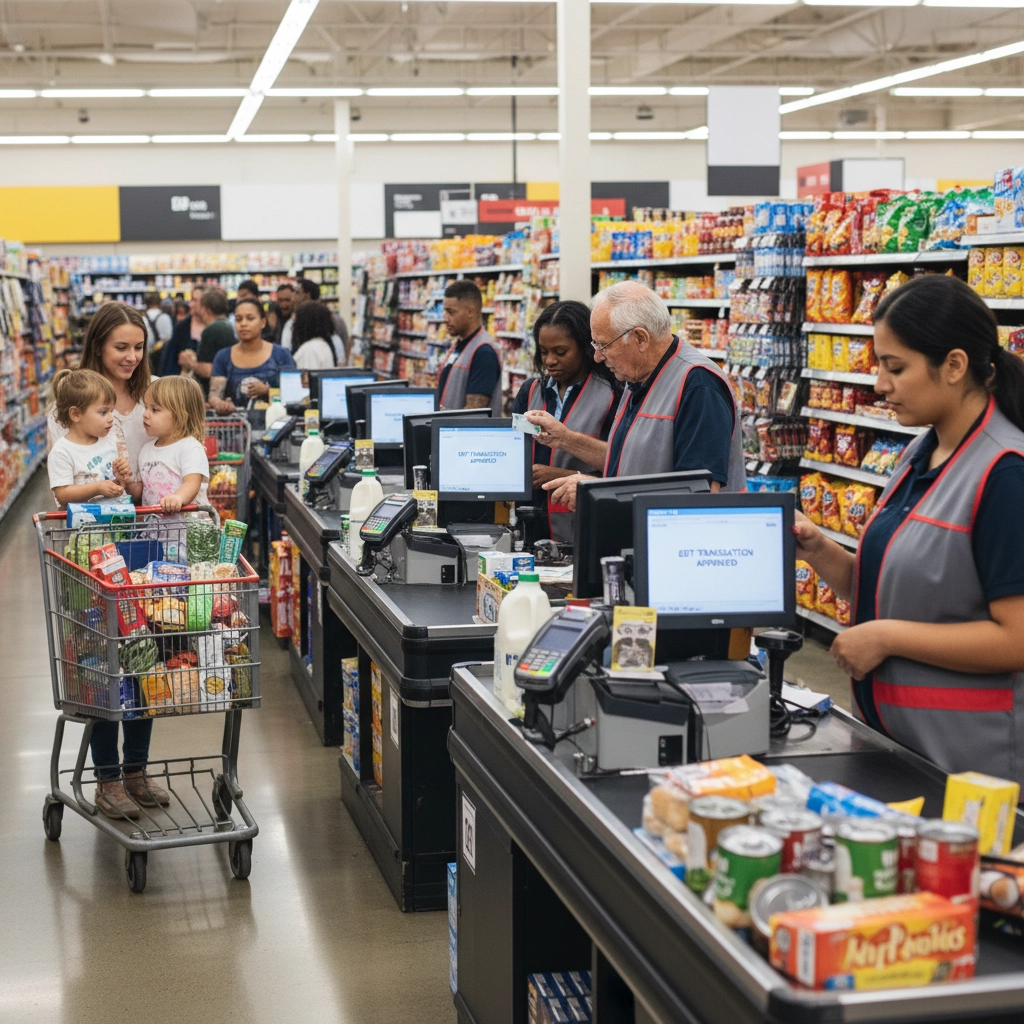SNAP Payments in Limbo as Judges Order Funding During Shutdown
- Randyb Dinwiddie
- Nov 3, 2025
- 5 min read
By Amerishop Editorial Desk November 3, 2025
Federal judges in Massachusetts and Rhode Island have stepped into the government shutdown crisis, ordering the administration to keep SNAP benefits flowing even as Washington remains gridlocked. The rulings came just in time for November's monthly benefit reload, but families across America are still watching and waiting to see if their EBT cards will actually get loaded this week.
With roughly 1 in 8 Americans depending on SNAP benefits: that's about 41 million people: any delay or suspension hits hard and fast. Food banks are already bracing for increased demand as uncertainty swirls around whether the November payments will arrive on schedule.
The Court Orders That Changed Everything
Two separate federal courts made it clear: the government cannot use the ongoing shutdown as an excuse to suspend SNAP benefits. The judges ordered agencies to tap into contingency reserves and explain their compliance plans by today, Monday, November 3rd.
This legal intervention represents a critical lifeline for millions of families who were facing the possibility of no food assistance just as their October benefits ran out. The Massachusetts and Rhode Island rulings specifically target the administration's attempt to halt payments during the shutdown negotiations.

The timing couldn't be more crucial. November benefits typically reload in the first few days of the month, and any significant delay would leave families scrambling to put food on the table during an already stressful time.
What the Shutdown Means for Your Benefits
Here's the reality check: even with court orders in place, some states are warning about potential processing delays. The federal machinery that moves billions of dollars in SNAP benefits every month doesn't just flip back on like a light switch after a shutdown disruption.
State agencies across the country are working to implement the court orders, but the technical and administrative challenges are real. Some states have better backup systems than others, and processing times may vary depending on where you live.
What families should know right now:
Court orders require funding, but don't guarantee instant processing
State-by-state implementation may cause uneven rollout timing
EBT cards should eventually receive November benefits, but exact dates remain unclear
Food banks are preparing for higher demand during any delay period
The USDA's Compliance Challenge
The United States Department of Agriculture now faces the complex task of explaining exactly how they'll meet these court mandates. With agencies ordered to report compliance by today, the pressure is on to show concrete steps toward getting benefits flowing again.
USDA's contingency reserves were designed for exactly this type of emergency, but accessing and deploying those funds during a shutdown creates bureaucratic complications that don't exist under normal operations. The department must navigate both legal requirements and administrative constraints simultaneously.

The agency's ability to process these payments quickly will determine whether families experience a minor hiccup or a major disruption in their food security. Past shutdowns have shown that even temporary delays can cascade into longer-term problems for vulnerable households.
State-by-State Variations in Implementation
Not all states are equally prepared to handle this situation. Some have robust backup systems and experienced staff who've navigated shutdown scenarios before. Others may struggle with the technical aspects of accessing federal contingency funds while their regular processing systems remain disrupted.
States with larger SNAP populations face particularly complex challenges. California, Texas, Florida, and New York process millions of benefit transactions each month, and any system glitches or delays get magnified across enormous beneficiary populations.
Key factors affecting state-level implementation:
Technical infrastructure and backup systems
Staff availability during shutdown
Experience with previous emergency benefit distributions
Coordination with federal systems and databases
The Ripple Effects Beyond EBT Cards
While the focus remains on getting November benefits loaded onto EBT cards, the broader implications extend far beyond individual families. Food retailers, especially smaller grocers in low-income communities, depend heavily on SNAP transactions for their revenue streams.
Grocery stores that serve SNAP-heavy neighborhoods could see immediate sales drops if benefits are delayed. This creates a secondary economic impact that reaches beyond the families directly affected by potential payment delays.

Food banks and charitable organizations are also preparing for increased demand. Even temporary delays in SNAP benefits historically lead to spikes in food pantry usage as families bridge the gap between when their benefits should arrive and when they actually do.
What Comes Next: Key Dates to Watch
The immediate focus is on whether USDA confirms full or partial benefit reloads this week. Families should monitor their state's SNAP websites and local news for updates on processing timelines in their specific area.
If deadlines slip or compliance reports show significant problems, additional court action becomes likely. Both the Massachusetts and Rhode Island courts made clear they're prepared to take further steps if the administration fails to meet their obligations to SNAP beneficiaries.
Critical dates ahead:
Today (November 3): USDA compliance reporting deadline
This week: Expected benefit processing window
Ongoing: Potential follow-up court hearings if problems persist
Practical Steps for Families Right Now
While the legal and political battles play out, families need practical guidance on managing their food budgets during this uncertain period. Here's what dependable sources recommend:
Check your current EBT balance first. Many families still have some October benefits remaining, and those funds continue to work normally even during processing delays for November benefits.
Contact your state SNAP office for the most current information about processing timelines in your area. State agencies often have more specific details about local implementation than federal sources.
Know your local food resources. Identify nearby food banks, pantries, and community organizations that can provide emergency assistance if needed. Many are specifically preparing for increased demand during this period.

Monitor official communications channels. Avoid social media rumors and stick to official state SNAP websites, local news sources, and verified government communications for accurate updates.
The Broader Context: Why This Matters
This SNAP funding crisis highlights deeper issues about how essential safety net programs get caught in political crossfire. When Washington gridlock affects basic food assistance, the real-world consequences hit vulnerable families immediately and hard.
The court interventions show that judges recognize SNAP benefits as more than just another government program: they're a critical lifeline that keeps families fed and communities stable. The legal system's response demonstrates the serious constitutional and humanitarian issues at stake.
Beyond the immediate crisis, this situation raises questions about building more resilient systems that can maintain essential services even during political disruptions. Other countries have developed shutdown-proof mechanisms for critical social programs, and these events may prompt similar discussions in the United States.
Looking Forward: Lessons and Preparations
While this particular crisis will eventually resolve, the experience offers important lessons for families, communities, and policymakers. Building personal emergency food supplies, understanding local assistance resources, and maintaining awareness of backup systems all become more important when government operations face disruption.

For policy makers, this situation underscores the need for more robust contingency systems that can maintain essential services regardless of political dynamics in Washington. The human cost of these disruptions extends far beyond the headlines and affects real families trying to meet basic needs.
The immediate priority remains getting November SNAP benefits processed and distributed. But the longer-term challenge involves building systems resilient enough to serve vulnerable populations consistently, regardless of whatever political storms may be brewing in the nation's capital.
As families wait for their November benefits to arrive, the dependable truth remains: millions of Americans rely on these programs for basic food security, and disrupting that assistance: even temporarily: creates hardships that ripple through entire communities. The court orders provide legal protection, but implementation remains the critical test of whether that protection translates into food on the table for families who need it most.
Is your business fully protected?
Dependable Brokers offers tailored Business Insurance for Missouri companies. Get peace of mind with custom protection—competitive rates, 24/7 support, and local expertise.
Your assets deserve dependable coverage.






































Comments